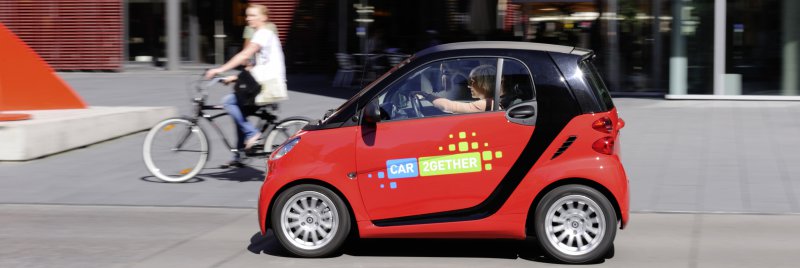German car maker Daimler (Mercedes-Benz) announced plans Tuesday to launch a ridesharing pilot called car2gether in Ulm, Germany. Gigaom referred to the pilot as "the Twitter of ride sharing" because of the Twitter-like stream of ride updates the system will generate to help web and mobile users find and give rides.
This is only the second time I've heard of a car maker going directly into ridesharing or carsharing. Peugeot and Daimler launched a car-sharing pilot in 2008. And the Daimler car2gether service is the first ridesharing service offered by a car maker.
Most ride-sharing and car-sharing systems are independent of car makers. In fact, carsharing and ridesharing threaten to reduce car sales. The more citizens share cars, the fewer cars needed.
So why would Daimler launch ridesharing and carsharing pilots?
There are several powerful market drivers converging that threaten their current business model:
- Young adults in some developed nations are less interested in owning cars, driving, and holding licenses than prior generations. Worldchanging and Advertising Age go into more detail about the trend as does the new book about collaborative consumption by Shareable advisor Rachel Botsman.
- The increasing cost of car ownership against the backdrop of declining real wages in the US and other developed nations.
- Rising awareness of cars' negative social and environmental impact.
- The increasing urbanization of the global population. Over 50% of the world's population lives in cities, and the United Nations predicts that will increase to 70% by 2050. There's less need for cars in cities. As Spride Share CEO Sunil Paul said recently, carsharing makes sense in densely populated areas and is "like cloud computing for cars."
- Increasing traffic congestion is decreasing the value of owning a car
Car companies have long been sensitive to the future because they have a lot at stake and the long lead time needed to develop new models. It makes good sense to explore these trends fully. What's more, they're in a great position to compete in these mobility as service markets if they commit to what would be a radical change in direction from manufacturer to service provider. Here's why:
- They could make cars designed specifically for carsharing and ridesharing like the p70t couch, a Japanese concept car designed as a public vehicle for cities.
- They have the financial muscle, engineering expertise, and global reach to build a global service platform that seamlessly combines carsharing and ridesharing. A partnership between ridesharing company Zimride and carsharing company Zipcar was announced last year, but a car company could integrate these services from the beginning.
- They could leverage their relationships with large institutional buyers to establish fleets and use their dealer network to support them.
- Their legendary marketing skills could bring mobility as a service into the mainstream.
- For all these reasons, they could outflank existing services which are tiny relative to car makers.
While it makes sense on paper, I'd be surprised if this happened. It's a radical shift for a such large companies. And change frequently comes from the margins like it already has in the carsharing and ridesharing markets.
I think it's more likely car companies will build for the various services rather than go into the mobility as service business themselves. Daimler's pilot would not be wasted if they decide not to scale it. They'd learn first hand what the carsharing and ridesharing service providers require and build accordingly.
I hope it goes this way. I would prefer to use a local carsharing service run as a nonprofit or cooperative, like City Carshare in San Francisco or PhillyCarShare in Philadelphia, than a global corporate behemoth.









